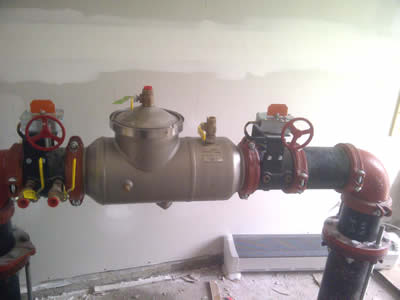Backflow and Cross Connection
 Residentially Speaking (Municipal)
Residentially Speaking (Municipal)
Water treatment equipment installation requires a good and fundamental understanding of plumbing materials and codes. Installers will utilize a wide range of skills to complete a job. Backflow and Cross connection is an important part of an installation yet is often the most overlooked.
Most municipalities have adopted bylaws that address backflow and cross connection. A Cross Connection Control Program (CCCP) sets out the requirements, credentials and bylaws that a building owner or a contractor must follow in that municipality. A well implemented CCCP will protect potable water sources, and the health and safety of the consumer from contamination. Drinking water treatment installers need to understand why this is important.
Backflow is the reversal or change in normal flow of water within a system. It is caused by broken pipes, ruptured water mains or a sudden demand within the system. It could be caused by thermal expansion in closed systems, or by a host of issues. If a water treatment device was not installed with this in mind, then possible damage or contamination could occur. Cross connection is the direct connection between a potable source and a non potable source. If a backflow condition occurs then that cross connection could allow unwanted substances into the system. (i.e. glycol, sewage) This puts a consumer at risk. It puts the installer at risk. Typically, the drinking water treatment installer is the last person to touch the plumbing system; last in- first blamed!
Water Treatment companies, manufacturers and dealers, need to be aware of the implications of their actions. In today’s business environment, negligence is a costly mistake. The difference between completing a project or “getting the sale” and not advising the customer of the requirement s for a correct installation is ethically wrong. One company may suggest that a backflow device is required and the next company in will play against that as a cost. The consumer needs to be aware.
Installers or technicians who are properly trained will be an asset to a dealer. Technical support and Sales staff with adequate training and available knowledge will be seen as credible. These people may not be licensed as a trade or certified but the more that they can learn the better the final product, Service or Installation.
Be aware of codes and by laws. Municipalities are requesting qualified individuals complete projects. Are you and your staff qualified? If not consider a CWQA training course. The knowledge gained only makes our industry better. An association with licensed and certified companies will become an asset as this type of policy is developed and matures in the drinking water treatment market.
For more information contact the Canadian Water Quality Association.



